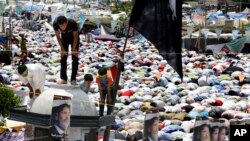CAIRO —
After several days of relative calm, violence overnight in Cairo between Egyptian police, backed by local residents, and supporters of ousted President Mohamed Morsi left at seven dead and about 260 people injured. Security forces have arrested 400 people for questioning over the violence.
The bloodshed came after supporters of Egypt's ousted president tried to block traffic at several key intersections and along a main Cairo bridge. Police and residents of nearby Giza stopped the protesters before they were able to cross that bridge.
Al-Ahram Online reported that some Morsi supporters were holed up at a mosque near Ramsis Square where violence first broke out. Witnesses say police fired tear gas to prevent the protesters from reaching nearby Tahrir Square where Morsi opponents were camped out.
On the political front, Egyptian media indicated that interim Prime Minister Hazem el-Beblawi might announce the formation of his new government late Tuesday. The names of some of his ministers, including Defense Minister Abdel Fattah el Sissi and Foreign Minister Hisham Fahmy, are already known.
Watch related video of VOA's Sharon Behn in Cairo
Presidential spokesman Ahmed Muslimany told journalists that members of both Mr. Morsi's Muslim Brotherhood and the Salafi Nour Party have been offered posts in the new government. Neither party, however, is expected to join.
Muslimany said Egypt's tumultuous political history of the past few years, including the divisive eras of two ousted presidents and a military government, have turned Egyptians against each other.
He said three different political periods of recent history have created rival ideologies and pitted everyone against everyone else. He says Egypt's interim presidency is now proposing that everyone work with each other, respecting each other's points of view, and living together despite their differences.
The presidential spokesman went on to say that each rival political faction contains both moderates and extremists. But, he argued, political life in every country centers on these factions coming to a consensus, since cooperation is needed for society to function.
Visiting U.S. Deputy Secretary of State William Burns echoed those ideas, urging Egypt's new interim leaders not to exclude anyone from a new government. Egyptians, he insisted, must “come together to find a nonviolent and inclusive path forward.”
The bloodshed came after supporters of Egypt's ousted president tried to block traffic at several key intersections and along a main Cairo bridge. Police and residents of nearby Giza stopped the protesters before they were able to cross that bridge.
Al-Ahram Online reported that some Morsi supporters were holed up at a mosque near Ramsis Square where violence first broke out. Witnesses say police fired tear gas to prevent the protesters from reaching nearby Tahrir Square where Morsi opponents were camped out.
On the political front, Egyptian media indicated that interim Prime Minister Hazem el-Beblawi might announce the formation of his new government late Tuesday. The names of some of his ministers, including Defense Minister Abdel Fattah el Sissi and Foreign Minister Hisham Fahmy, are already known.
Watch related video of VOA's Sharon Behn in Cairo
Presidential spokesman Ahmed Muslimany told journalists that members of both Mr. Morsi's Muslim Brotherhood and the Salafi Nour Party have been offered posts in the new government. Neither party, however, is expected to join.
Muslimany said Egypt's tumultuous political history of the past few years, including the divisive eras of two ousted presidents and a military government, have turned Egyptians against each other.
He said three different political periods of recent history have created rival ideologies and pitted everyone against everyone else. He says Egypt's interim presidency is now proposing that everyone work with each other, respecting each other's points of view, and living together despite their differences.
The presidential spokesman went on to say that each rival political faction contains both moderates and extremists. But, he argued, political life in every country centers on these factions coming to a consensus, since cooperation is needed for society to function.
Visiting U.S. Deputy Secretary of State William Burns echoed those ideas, urging Egypt's new interim leaders not to exclude anyone from a new government. Egyptians, he insisted, must “come together to find a nonviolent and inclusive path forward.”







